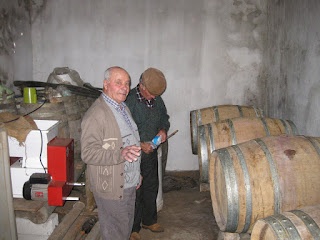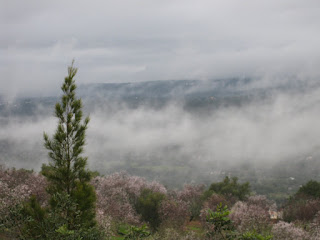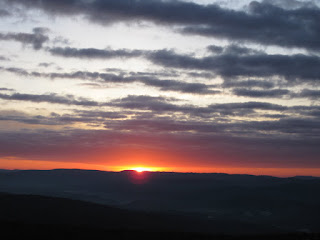 It is not often that I sit down to write to you before lunch while digesting a generous measure of local wine. Today is an exception. This is because I was waylaid on my way home from Idalecio’s wood yard by his father, Ermenio, who enticed me into their ancient cellar and plied me with their latest vintage.
It is not often that I sit down to write to you before lunch while digesting a generous measure of local wine. Today is an exception. This is because I was waylaid on my way home from Idalecio’s wood yard by his father, Ermenio, who enticed me into their ancient cellar and plied me with their latest vintage.But I’m getting ahead of myself. Friday started like most days with coffee and toast and an exchange of emails with the SA financial firm that is assisting me to obtain the benefits of long-dormant investment policies. This process has proved analogous to pulling teeth with exceedingly long pliers from a reluctant dinosaur. But that’s a story for another day.
 After breakfast we walked the dogs along the valley road and back to the car via a dirt track, trying to avoid the boggy bits and dodging the puddles left by an inch of rain. Jones took pictures of the almond trees whose pink and white halos have exploded all across the valley.
After breakfast we walked the dogs along the valley road and back to the car via a dirt track, trying to avoid the boggy bits and dodging the puddles left by an inch of rain. Jones took pictures of the almond trees whose pink and white halos have exploded all across the valley.  They’re glorious but their glory is proving short-lived in the wind and the rain. A confetti of blossom drifts down with every gust and stains the ground below.
They’re glorious but their glory is proving short-lived in the wind and the rain. A confetti of blossom drifts down with every gust and stains the ground below.  Mid-morning I took the tractor down to fetch a load a load of firewood from the Palmeira family farmyard. While Idalecio tossed pieces into the box, I wandered over to watch his brother, Jose Carlos, stripping long canes of the leaf that clings to the nodes. To do this, he was running the canes one by one through an old machine, secured to a pallet on the back of their delivery lorry.
Mid-morning I took the tractor down to fetch a load a load of firewood from the Palmeira family farmyard. While Idalecio tossed pieces into the box, I wandered over to watch his brother, Jose Carlos, stripping long canes of the leaf that clings to the nodes. To do this, he was running the canes one by one through an old machine, secured to a pallet on the back of their delivery lorry.  The canes are to refurbish the roof of the family wine cellar in the traditional manner. For centuries it has been the custom in these parts to make a roof by laying tiles on top of canes secured to wooden poles. These days people tend to insert a strip of insulation as well. Such a roof should last for a couple of generations.
The canes are to refurbish the roof of the family wine cellar in the traditional manner. For centuries it has been the custom in these parts to make a roof by laying tiles on top of canes secured to wooden poles. These days people tend to insert a strip of insulation as well. Such a roof should last for a couple of generations.  Idalecio’s dad stuck a hose into a barrel to draw off a couple of (plastic) glasses’ worth of his 2010 vintage. I found the wine surprisingly good, an opinion endorsed by old Miguel, who was also persuaded to take a draft. Light beamed down on to the dusty barrels from gaps in the soon-to-be-replaced roof.
Idalecio’s dad stuck a hose into a barrel to draw off a couple of (plastic) glasses’ worth of his 2010 vintage. I found the wine surprisingly good, an opinion endorsed by old Miguel, who was also persuaded to take a draft. Light beamed down on to the dusty barrels from gaps in the soon-to-be-replaced roof.  The cellar lay in the lee of a carob shed, to which we ascended. It was stacked to the rafters with the summer crop, whose delivery to the processing factory awaited an improve- ment in the market price. I got Ermenio to pose beside the pile of carobs towering over his head. His wife declined to be snapped.
The cellar lay in the lee of a carob shed, to which we ascended. It was stacked to the rafters with the summer crop, whose delivery to the processing factory awaited an improve- ment in the market price. I got Ermenio to pose beside the pile of carobs towering over his head. His wife declined to be snapped.Thus refuelled, and bearing an additional 5 litres of wine and a sack of pumpkins, I clambered back on to the tractor and took myself and my load home.
 Lunch was waiting - soup made from newly-picked broccoli. It’s delicious. Jones snips off a couple of heads of the vegetables growing in Jorge Vieira’s fields during our walk. What doesn’t go into the soup, finds its way into the supper salad instead.
Lunch was waiting - soup made from newly-picked broccoli. It’s delicious. Jones snips off a couple of heads of the vegetables growing in Jorge Vieira’s fields during our walk. What doesn’t go into the soup, finds its way into the supper salad instead.  Jones arrives in my letter at an appropriate point; she and Natasha must both be commended for their efforts to remove tons of gravel and sand from Banco’s Broadwalk, where it had been deposited the previous week by Cesar, the building supplies delivery man. (Our property is located on such a steep hill that lorries have great difficulty making such deliveries anywhere else.) I had expected Nelson, our worker, to assist us in shifting it but he phoned to say he wasn’t coming.
Jones arrives in my letter at an appropriate point; she and Natasha must both be commended for their efforts to remove tons of gravel and sand from Banco’s Broadwalk, where it had been deposited the previous week by Cesar, the building supplies delivery man. (Our property is located on such a steep hill that lorries have great difficulty making such deliveries anywhere else.) I had expected Nelson, our worker, to assist us in shifting it but he phoned to say he wasn’t coming. The gravel – actually a mixture called “turvena” – was intended to improve the path up through the park to the top of the property. The sand was for future garden construction. Both piles were partially blocking the right of way at the bottom of the garden. More importantly, they were threating some of Jones’s plants.
The gravel – actually a mixture called “turvena” – was intended to improve the path up through the park to the top of the property. The sand was for future garden construction. Both piles were partially blocking the right of way at the bottom of the garden. More importantly, they were threating some of Jones’s plants. My part was to back the tractor up to the gravel, which my workers then shovelled on board. (Shovelling anything is anathema to my spine.) With the box full, I backed 50 metres up the hill to unload the mixture by passing buckets over the fence, to be scattered on the path. It was hard work.
My part was to back the tractor up to the gravel, which my workers then shovelled on board. (Shovelling anything is anathema to my spine.) With the box full, I backed 50 metres up the hill to unload the mixture by passing buckets over the fence, to be scattered on the path. It was hard work. We spent the morning and most of the afternoon at it, spreading four tractor boxes of gravel along the path and then shifting two more of sand. The sand we unloaded into a corner of the tractor shed, just in time to get it out of the rain the following day.
We spent the morning and most of the afternoon at it, spreading four tractor boxes of gravel along the path and then shifting two more of sand. The sand we unloaded into a corner of the tractor shed, just in time to get it out of the rain the following day.  I complimented my workers on their efforts, admitting that I hadn’t expected to finish the job that day; Jones replied it was because they were women. I didn’t deny her that satisfaction although I don’t think it had much to do with gender.
I complimented my workers on their efforts, admitting that I hadn’t expected to finish the job that day; Jones replied it was because they were women. I didn’t deny her that satisfaction although I don’t think it had much to do with gender. That was Tuesday. Thursday we tried to go walking down in the valley but a plague of hunters drove us back up the hill. They were everywhere and not overly fussed about the distance they were keeping from the road.
That was Tuesday. Thursday we tried to go walking down in the valley but a plague of hunters drove us back up the hill. They were everywhere and not overly fussed about the distance they were keeping from the road.We are making daily use of our new satellite digibox. But there’s one weird anomaly for which I can find no explanation. The time given on the box comes from the satellite. But it’s several minutes slow. This means that recordings start late unless I remember to start them early. Any suggestions from technically minded readers will be appreciated.
 Still on high-tech themes: to try to awaken a sleepy left foot, a product of my back troubles, I have been supplied with an electronic box. Four dangling wires hook up to my calf with adhesive pads, supposedly for three hours a day. They transmit a flow of shocks through the muscle. The intensity (fortunately) can be controlled by the wearer. I wander around looking like a human computer accessory.
Still on high-tech themes: to try to awaken a sleepy left foot, a product of my back troubles, I have been supplied with an electronic box. Four dangling wires hook up to my calf with adhesive pads, supposedly for three hours a day. They transmit a flow of shocks through the muscle. The intensity (fortunately) can be controlled by the wearer. I wander around looking like a human computer accessory. I have finished reading Karen Armstrong’s book on the bible and am now ploughing through a hefty tome on the origins of words. Most derivations are of undistinguished Latin or Greek extraction but some are simply delightful - “costermonger” or “cockatrice” for instance. Best are the origins of expressions, such as “cock-a-hoop” or “chop-chop” (closely related to “chop stick”), whose roots have been lost in the mist of time.
 If all this sounds dense, it is. Density (denseness?), however, suits my purpose, which is as much to prepare to sleep as to learn about word origins. I tackle about a page a night; after this my eyes glaze over and my brain goes into standby mode – as long as none of the bed’s occupants is snoring, that is. I can’t fall asleep to a background of snores.
If all this sounds dense, it is. Density (denseness?), however, suits my purpose, which is as much to prepare to sleep as to learn about word origins. I tackle about a page a night; after this my eyes glaze over and my brain goes into standby mode – as long as none of the bed’s occupants is snoring, that is. I can’t fall asleep to a background of snores. I am reminded of a dream I had. I was following Jones on to the large, flat deck of an ocean liner. To my alarm, the deck was covered with several inches of water.
I am reminded of a dream I had. I was following Jones on to the large, flat deck of an ocean liner. To my alarm, the deck was covered with several inches of water. This did not seem to bother Jones, who splashed across to see some friends. We advanced to the bow, from which I was able to swing athletically down the side of the ship to a beach. Several onlookers admired my uncharacteristic agility. I remarked to Jones that I had my doubts about whether the ship might be refloated, for she was well and truly grounded and I couldn’t see the tide lifting her off again.
 Where we had been going, or why, did not occur to me. Dreams have a way of starting in the middle of things – and often finishing there as well.
Where we had been going, or why, did not occur to me. Dreams have a way of starting in the middle of things – and often finishing there as well.
No comments:
Post a Comment